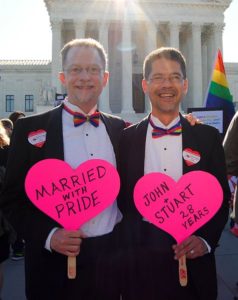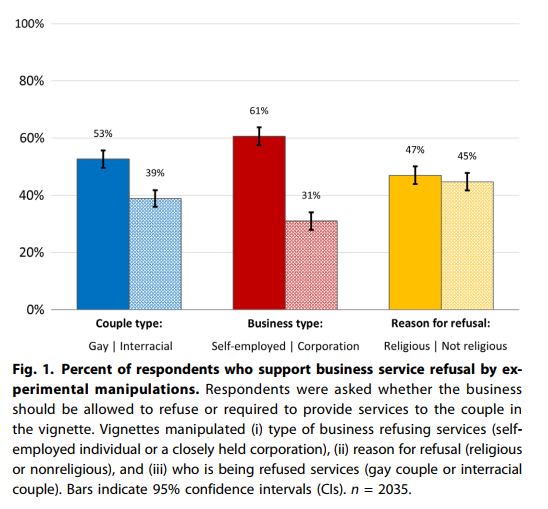
The Supreme Court is hearing a case—Masterpiece Cakeshop, Ltd. v. Colorado Civil Rights Commission—about whether a business can refuse service to a gay couple for religious reasons. But is this case really about religious liberty, or is it about something else?
In a national survey experiment with Brian Powell and Lauren Apgar, we asked Americans what they thought about denial of services. What they said surprised us.
We presented people with a vignette—or short scenario—in which a gay or interracial couple attempted to purchase wedding invitation portraits and was refused service. These vignettes varied the reason for refusal (religious/nonreligious) and the type of business refusing services (individual/corporation). We then asked our respondents to tell us whether they supported the refusal.
We expected religion reasons for refusal to be key in whether Americans supported refusal. But, surprisingly, people who support denial of service don’t see it as a matter of religious freedom. Americans were just as likely to support a business denying service for non-religious reasons as for religious reasons. In other words, religious freedom has no impact on Americans’ beliefs about denial of service.

And while Americans were more likely to support refusal to a gay couple (53%), there was surprisingly strong support for business denying services to interracial couples (39%) despite laws prohibiting racial discrimination. In fact, there was no difference in support for refusal by couple type once we accounted for Americans’ greater opposition to same-sex marriage than interracial marriage.
Challenging the notion that a corporation like Hobby Lobby should have the same rights as individuals, Americans were twice as likely to support refusal by an individual than by a corporation.
When looking at each possible scenario separately, we see that an astonishing 59% of Americans support a self-employed individual refusing services to an interracial couple for religious reasons. And while there is a tendency for religious reasons to elicit higher support for refusal to interracial couples (this tendency is significant when collapsing all interracialc couple cases), religious reasons clearly do not elicit greater support for refusal to same-sex couples.

Although religious freedom does not seem to drive support for service refusal, people’s own opposition to same-sex relationships is a key factor in whether they support service refusal. A whopping 90% of people who oppose same-sex marriage support denial of service by self-employed individuals. And people who oppose same-sex marriage don’t care if the refusal was for religious reasons or not, they endorse it either way.

Evangelicals are much more likely than non-evangelicals to support refusal. But, importantly, religious freedom does not matter to evangelicals in their support for refusal: the vast majority of evangelicals support refusal to sexual minorities, regardless of whether the refusal was for religious reasons.

In comparison to the experimental patterns, the general demographic patterns in overall support for refusal were largely unsurprising: men, heterosexuals, older people, those with less education, those in rural areas, Republicans, conservatives, and those who attend religious services more frequently were more likely to endorse denial of service than their counterparts. Although blacks are less supportive of same-sex marriage, they are more opposed to denial of services to sexual minorities than are whites.
In addition to the closed-ended questions, we also asked respondents to explain why they supported or opposed denial of service. Those who opposed service refusal consistently said that denial of service to any minority group is discrimination. Several people who read the same-sex couple vignettes—and thus were unaware of the parallel interracial couple vignettes—explicitly equated service refusal to gay couples with historical denial of services to African Americans.
In contrast, the respondents who supported refusal frequently gave a justification related to individual rights or libertarianism. But sometimes they just admitted that they supported service refusal because of their own opposition to same-sex relationships.
A substantial number of people supported same-sex marriage and yet still endorsed refusal. These people seemed to assume that customers will boycott discriminatory businesses in droves. To them, the free market will sort things out, penalizing discriminatory companies and eventually putting them out of business. Notably, discussions of artistic expression and freedom of speech were mostly absent despite their importance in legal discussions.
From the perspective of the American public, the Masterpiece Cakeshop case is not about religious freedom or artistic expression. Instead, it is about whether a business can discriminate between different types of customers for any reason, serving people they want to serve and refusing people they don’t want to serve.

No Comments